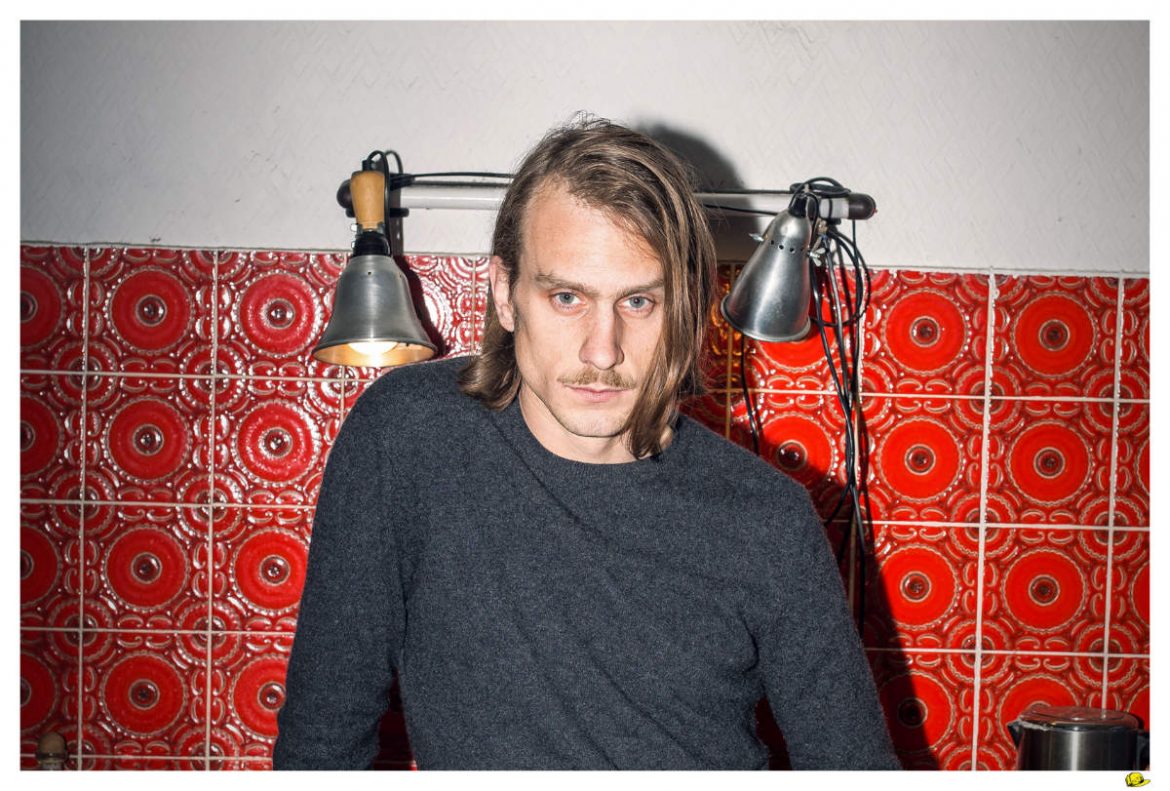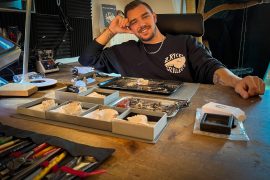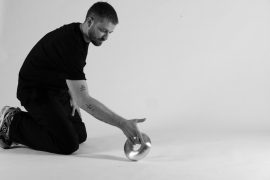Name: Lucas Croon
Alter: 33
Job: Komponist Film&TV, Solokünstler & DJ
Gelernter Beruf: Musikproduktion
Instagram: lucascroon
Soundcloud: Lucas Croon
Lucas Croon arbeitet als DJ, Producer, Komponist – und ist vielen ein Begriff als Bandmitglied von Stabil Elite oder BAR. Als Resident-DJ im Salon des Amateurs und nach zehn Jahren im Business gehört er zu den Düsseldorfer Künstlern, die auch international erfolgreich sind und die Leidenschaft zum Beruf gemacht haben. Schon lange bevor der ganzen Welt in einem drastischen Ausmaß bewusst wurde, wie wichtig Flexibilität ist, hat Lucas genau diese Fähigkeit bewiesen, indem er sich mal eben ein x-tes Standbein als Komponist aufbaute.
>> Please scroll down for English version <<
Sich durch das musikalische Repertoire von Lucas Croon und seinen diversen Projekten zu wühlen, ist ein bisschen wie mit einer Zeitmaschine durch die regionale Musikgeschichte zu reisen. Zwischen Krautrock, Elektro-Pop und treibendem House findet man überall perfektionistisch verarbeitete Zitate der großen Kultbands der Stadt, von Neu! bis Kraftwerk.
Nun stelle man sich vor, man steigt aus der Croon’schen Zeitmaschine aus und steht plötzlich in einer ganz anderen Galaxie, in der man umgeben ist von atmosphärischen Sounds und intensiven Streichern. Der Düsseldorfer Künstler setzt seine Kompositionen durch sein Dasein als DJ, aber auch als Mitglied in Bands den verschiedensten Situationen aus und ist damit immer wieder erfolgreich – seit ein paar Jahren auch in Filmmusik-Gefilden. Nachdem der Stabil-Elite-Fan, Düsseldorfer und preisgekrönte Regisseur Jan Bonny auf den Salon-Sohn aufmerksam wurde, ging für Lucas ein langjähriger Traum in Erfüllung. Er komponierte Musik für Filme und deutsche Kult-Krimiserien wie den Tatort und Polizeiruf 110. Prompt öffnete sich ihm ein neues Arbeitsfeld, das ihn weg von Clubnächten und hin zu detailverliebter Arbeit im Studio führte.
Man kann dich ja schon als musikalisches Multitalent bezeichnen: DJ-ing, Produzieren, Komponieren, Live-Auftritte, Kunstprojekte – was liegt dir am meisten? Ich glaube, ich mache so vieles, weil ich für bestimmte Sachen ein ganz gutes Gespür habe. Ich bin weder ein superguter Instrumentalist, noch ein begnadeter Komponist, aber ich habe ein Gefühl für manche Dinge oder zumindest ein Talent, das ich über die Jahre vertieft habe. Irgendwann hat man eine Palette, mit der man arbeiten kann. Am ehesten liegt mir deshalb wohl die Musikproduktion, weil das sowohl die Komposition, als auch die Arbeit am Klang und weiterem umfasst.
Hast du irgendein Instrument gelernt? Ich habe mit 17 Jahren aus eigenen Stücken angefangen Klavierunterricht zu nehmen, war aber superfaul und bin fast nie hingegangen. Das habe ich zwei Jahre lang gemacht und auch was gelernt, aber ich war nie der Schüler, der sich zuhause noch eine Stunde hinsetzt und übt. Letztendlich habe ich es trotzdem aus eigenem Antrieb gemacht, aber ich hatte nie den Traum Pianist zu werden. Ich war eher neugierig und wollte in der Lage sein selbst Akkorde zu schreiben. Und obwohl ich im Unterricht das Notensystem gelernt habe, bin ich immer noch total schlecht im Notenlesen – wenn du mir ein Stück gibst, brauche ich drei Tage, bis ich die erste Zeile spielen kann. Dafür kann ich nach Gehör die Sachen nachspielen.
Wie kam es dazu, dass du dich der Filmmusik zugewandt hast? Das wollte ich eigentlich schon immer machen. Ich habe auch in einem Interview vor zehn Jahren mal gesagt, dass es mein Traum wäre, mal Musik für den Tatort zu schreiben. Und irgendwann ist es durch sehr viele glückliche Zufälle wirklich dazu gekommen. Ich bin halt kein gelernter Komponist, sondern Musiker. Und durch die Sachen, die ich gemacht habe, ist der Düsseldorfer Regisseur Jan Bonny auf mich aufmerksam geworden und sprach mich an. Ich dachte: “Fuck, das ist ja geil, aber wahrscheinlich meldet er sich eh nicht”, aber dann hat er mich tatsächlich nach ein paar Tagen angerufen und das Ganze ins Rollen gebracht. Ich glaube, ihm hat einfach gefallen wie ich arbeite und was ich mache, und daraufhin haben wir die Zusammenarbeit angefangen – wir arbeiten mittlerweile schon seit vier oder fünf Jahren zusammen.
Wie fühlt es sich an, wenn so ein Traum in Erfüllung geht? Super! Es ist sehr erfüllend! Als DJ gibt es viele kleine Erfolge, die man nicht unbedingt mit seinen Eltern teilen kann – und das ist dann eher sowas, womit man auch sie stolz macht. Es geht natürlich nicht nur darum, denn ich verdiene mit den Kompositionen auch mein Geld, aber es ist eine Mischkalkulation. Mal verdiene ich mit dem DJ-ing auch ganz gut. Aber gerade in der Corona-Zeit ging gar nichts mehr – deswegen war ich sehr froh, dass ich Musik für Werbung machen durfte.
Gibt es für dich Parallelen zwischen der Arbeit an Filmmusik und anderen Projekten, die eher elektronischer oder populärer Musik zugewandt sind? Ich gehe da immer sehr ehrgeizig ran. Für die Werbe- und Filmprojekte habe ich meistens ein Briefing oder eine Idee, die Jan mitbringt. Ich habe immer gerne mit einer vorgegebenen Idee gearbeitet und Kunden glücklich gemacht. Dabei habe ich nie gedacht, “Oh man, jetzt bin ich kein Künstler mehr, sondern mache irgendwelche Dienstleistungen”. Ganz im Gegenteil, ich finde das super und würde sowas gerne noch mehr machen. Solche Projekte geben mir Raum, auch mal für mich anders kreativ zu sein.
Worin besteht für dich der Reiz bei der Komposition von Filmmusik? Das macht man auch ein bisschen mit dem Geld im Hinterkopf, weil es einfach anders bezahlt wird als DJ-Gigs oder die Gage als Live-Musiker. Außerdem ist es eine Herausforderung. Und wenn ich was anfasse, dann mache ich das auch richtig. In der Hinsicht finde ich das immer herausfordernd. Da ich das Komponieren nicht studiert habe, fiel es mir am Anfang noch schwerer, aber man wächst eben mit seinen Herausforderungen.
Du hast unter anderem für Jan Bonny’s „Wintermärchen“ und „Wir wären andere Menschen“ die Musik komponiert – die zwei Filme wirken sehr unterschiedlich, der eine verzweifelt und still, der andere pausenlos aufgebracht. Worin bestand der Unterschied in der Komposition der Filmmusik? Bei “Wir wären andere Menschen” haben wir die Filmmusik eher im klassischen Sinn eingesetzt – teilweise mit echten Streichern, teilweise mit dem Computer. “Wintermärchen” dagegen basiert auf dem NSU-Stoff und hat dadurch schon eine gewisse Brisanz, aber die Filmmusik unterscheidet sich schon allein darin, dass wir uns gegen den Einsatz von dramaturgischer Musik entschieden haben. Die Musik passiert eher in der Handlung, das heißt: wenn die Darsteller im Film in eine Bar gehen, läuft da Musik, die ich geschrieben habe. Es gibt im Film wenig dramaturgische Streichereinsätze, sondern es sollte alles sehr realitätsnah bleiben. Deswegen gibt es gar nicht so viel Filmmusik, aber trotzdem relativ viel szenische Musik von den Straßen im Film.
Als Titeltrack habe ich ein Stück von den Ärzten gecovert. Das war auch eine Entscheidung, die ich gemeinsam mit Jan gefällt habe. Dafür habe ich mir die Noten runtergeladen und schon gemerkt: das funktioniert nicht so gut… Also habe ich das Stück erstmal ganz leise zuhause auf dem Klavier gespielt und den Text dazu geflüstert, weil ich noch nicht so inbrünstig singen konnte. Dadurch wurde der Charakter des Stücks so stark verändert, dass Jan direkt meinte: Das ist es! Bei der Premiere war das ein superguter Moment, weil die Leute angefangen haben zu weinen und mitzusingen – das war echt crazy.
Arbeitest du lieber alleine oder im Team? Obwohl ich es immer gerne mag mit anderen Leuten Zeit im Studio zu verbringen, Aufnahmen zu machen und zu jammen, arbeite ich lieber alleine. Sobald es darum geht Dinge abzuarbeiten, brauche ich meine Ruhe und möchte nicht, dass mir irgendwer über die Schulter guckt.
Was gibt es Neues von deinen Projekten Stabil Elite und BAR? Es gibt beide Projekte noch, aber wie es eben manchmal im Leben ist, gibt es Veränderungen. Bei Stabil Elite war nach dem letzten Album einfach die Luft raus und jeder hat sich nach anderen Sachen gesehnt, und dann war es ganz normal, dass wir nach der Tour nicht direkt wieder ins Studio gegangen sind. Wir hatten einfach keine Lust darauf.
Bei BAR war es so, dass Christina und ich uns sowohl als Paar, als auch räumlich getrennt haben. Es gibt ganz viele neue Tracks, die noch in der Pipeline sind, aber ich glaube, es dauert noch ein bisschen, bis wir das vollenden.
Dein Feature auf dem Album „Balearic Beats“ von Buena Onda – wie kam es dazu? Dieser balearische Sound ist eigentlich, wo ich musikalisch herkomme. Meine letzten Remix-Veröffentlichungen sind alles Stücke, die ich vor fünf bis zehn Jahren gemacht habe, die sich angehäuft haben und bei anderen Veröffentlichungen übriggeblieben sind. Und jetzt bekomme ich vermehrt Anfragen nach solchen Stücken, die schon fertig und übrig sind. Ich hab Buena Onda das Stück geschickt, sie fanden es super und haben es genommen. Für mich ist es komisch, weil die Sachen jetzt schon etwas älter sind und ich mittlerweile musikalisch eigentlich schon wieder woanders stehe, aber ich freue mich, dass sie noch das Licht der Welt erblicken.
Was hast du momentan für Projekte am Start? Was bringt die Zukunft? Ich habe eigentlich immer den großen Plan gehabt, mich mal für ein paar Monate zurückzuziehen um mein erstes Album zu schreiben. Dazu ist es nicht richtig gekommen, weil dann Corona kam und ich wieder Kohle heranschaffen musste. Und dann kamen die Remix-Anfragen. Das Gute daran ist, dass das die Zeit zu meinem letzten Solo-Release auffüllt, sonst wäre die nächste Veröffentlichung erst in einem Jahr gekommen – so sind dazwischen nochmal drei, vier Remixe rausgekommen. Manchmal ärgere ich mich darüber, dass ich nicht dazu komme, meine eigenen Sachen anzugehen, andererseits verdiene ich dadurch Geld und bleibe im Gespräch.
War es jemals eine Option für dich Düsseldorf zu verlassen? Wieso bist du geblieben? Ich bin grundsätzlich nicht abgeneigt davon, aber ich würde das erst machen, wenn ich ein tolles Angebot oder ähnliches bekomme. Ich habe nicht das Gefühl, dass ich hier fest stecke oder einen Tapetenwechsel brauche. Ich bin viel in Köln, reise normalerweise viel, und habe eine gute Infrastruktur: Ich habe hier ein Studio, bezahle ziemlich wenig Miete, der Salon… ich fühle mich hier wohl.
Die Düsseldorfer Musikszene ist bekannt für ihren Zusammenhalt – wie erlebst Du den gegenseitigen Support momentan? Die Szene ist sehr freundschaftlich und unterstützend, aber in gewisser Weise auch kompetitiv. Konkurrenzkampf gibt es schon, aber eben in einer gesunden Art. Wenn ich die neue Generation an Musikern höre, freue ich mich, dass die Szene wieder neu belebt wird. Ich finde es sehr erfreulich, dass es junge Leute gibt, die den Mehrwert erkennen, die Musik verstehen und für sich entdecken, weil ich vor zehn Jahren genauso war. Ich finde es wichtig, dass es hier weitergeht und es nicht nur Leute gibt, die sich in der Altstadt betrinken, sondern eben auch welche, die sich musikalisch mit dem Erbe der Stadt auseinandersetzen.
Welche Alben haben Dir durch die Quarantäne geholfen? Naja, ich höre beruflich viel, ich mache viel Musik selbst – da bleibt nicht so viel Zeit zuhause noch irgendwelche Lieblingsalben zu hören. Wenn ich Musik höre, versuche ich mich fortzubilden und neue Sachen zu entdecken. Beim Auflegen wird einem selbst am schnellsten langweilig, wenn man samstags wieder die gleichen Stücke spielt wie die Woche davor – das macht irgendwann keinen Spaß mehr. Ich muss mich updaten, damit es auch für mich interessant bleibt. Das mache ich anhand von Neuveröffentlichungen, als auch alten Sachen aus dem Tanz-Segment.
Ein Album fällt mir leider nicht ein. Wenn ich zuhause bin, mache ich das Radio an. Ich mag es am liebsten, wenn das Radio so klingt wie in meiner Kindheit – mit Hits aus den 80ern und 90ern. Aber wenn ich dann richtig Musik höre, gehe ich Sachen durch und skippe viel. Das ist zwar ein bisschen traurig, aber ich hab einfach nicht so viel Muße oder Lust.
Mit welcher Person – tot oder lebendig – würdest du gerne ein Altbier trinken gehen? Joseph Beuys!
Danke!
Text: Maren Schüller
Foto: Foto Schiko
© THE DORF 2020/21
English version:
Name: Lucas Croon
Age: 33
Job: Composer, cinema and TV, solo artist & DJ
Profession: Music producer
Instagram: lucascroon
Soundcloud: Lucas Croon
Lucas Croon is a DJ, producer, composer and known by many as a band member of Stabil Elite and BAR. As Salon des Amateurs’ resident DJ and after ten years in the business he belongs to the Düsseldorf artists who have gained international fame and who could turn their passion into a profession. Long before the world learned the hard way about the importance of flexibility, Lucas proved this ability by building his nth mainstay as a composer out of the cuff. Browsing through Lucas Croon’s musical repertoire and the variety of projects is like a journey through regional music history in a time machine. Between krautrock, electro-pop and house everywhere hide some perfect arrangements of quotes by the city’s famous cult bands from Neu! to Kraftwerk.
Now imagine stepping out of Croon’s time machine and suddenly standing in a completely different galaxy surrounded by atmospheric sounds and intense strings. Because he is a DJ but also a band member, the compositions by the Düsseldorf artist are often successfully exposed to multiple situations – in recent years also in film scores. When the Stabil Elite fan, Düsseldorf citizen and award-winning movie director Jan Bonny came across the Salon resident, a long-felt dream came true for Lucas: he composed the music for movies and German cult TV series like Tatort and Polizeiruf 110. Promptly a new field of work opened-up, taking him away from the club nights into the studio where he turned to a stickler for details.
You’re almost a musical multi-talent: DJ-ing, producing, composing, live shows, art projects, what do you like most? I do so much stuff, I guess because I have a good sense for certain things. I’m neither a super gifted instrumentalist, nor an exceptional composer, but I have a feeling for certain things or a talent at least, which I could develop over the years. Eventually, you have a whole range available to work with. Probably this is why music production suits me most because it includes composing as well as the work with sound and other fields.
Did you learn to play any instrument? At the age of 17, I started taking piano lessons of my own accord, but I was super lazy and almost missed every lesson. I did this for about two years and even learned something, but I was never the kind of guy who would sit down at home for one more hour to practice. I did it voluntarily in the end but becoming a piano player has never been a dream of mine. Rather, I was curious and wanted to be able to write my harmonies. And although I learned to read notes, I’m still really bad at it – if you give me a piece, I need three days until I can play the first line. But I can easily play everything by ear.
How did you get into film music? I’ve always wanted to do that. Ten years ago, I also said in an interview that composing the music for Tatort was a dream of mine. And thanks to many lucky coincidences it happened one day. I’m not a composer by trade but a musician. And because of all the things I’ve done, the Düsseldorf movie director Jan Bonny took notice and got in touch. I thought: “Fuck, that’s awesome, but most probably he will never come back to me again”, but in fact, he called me up a few days later and got things rolling. I guess, he just liked my way of working and what I do, and that’s when we started our collaboration – we’ve been working together for four or five years now.
How does such a dream come true feel like? Great! It’s fulfilling! As a DJ you enjoy many small moments of success that you can’t really share with your parents – and this is something that makes them proud too. It’s certainly not only about that because I earn money by composing, but it’s a mixed calculation. Sometimes I earn OK by DJ-ing. But especially during the time of Corona nothing happened anymore – therefore I was really happy that I could write music for commercials.
Do you think there are parallels between working on film music and other projects which are more about electro or popular music? I’m always very ambitious. For the commercial or movie projects, I usually get a briefing or an idea from Jan. I always enjoyed working with a predefined idea and making clients happy. I never thought, “Damn! I’m no longer an artist now; I only offer some a service.” It’s the opposite, I like it a lot and would love to do this more often. Such projects offer me the space to be creative for myself in a different way.
What’s the particular appeal of composing film music for you? To some extent, you do this with money in mind because it pays differently than DJ or live gigs. But it’s a challenge above all. And when I commit to something, I do it the right way. With this in mind, it’s always demanding. Since I never studied composing, it used to be more difficult in the beginning, but you grow by overcoming obstacles.
You composed the music for Jan Bonny’s “A Winter’s Tale” and “Wir wären andere Menschen” (EN: We’d be different people) – two movies which seem to be quite different; one is desperate and quiet, the other non-stop upset. What was the difference in composing the music? In ”Wir wären andere Menschen“ we rather implemented the music in a traditional sense – partly by using real strings, in parts by using computers. Based on the NSU topic, “A Winter’s Tale” is already kind of explosive by nature, but the music differs because we decided to avoid any dramatic music. The music plays alongside the plot, in other words: when the actors enter a bar in the film, there’s music playing which I have written. There are very few dramaturgical string parts in the movie, everything should remain close to reality instead. Therefore, there’s not much film music but quite a lot of scenic music from the streets in the film.
As a title track, I covered a song by “Die Ärzte, a decision that I took together with Jan. After I downloaded the notes, I knew: it won’t be that easy… Thus, I started by playing the song softly on my piano at home and whispered the lyrics because loud singing was not my thing yet. It changed the character of the song very much, and Jan said: that’s it! At the premiere it was such a great moment because people started crying and singing along – this was crazy!
Do you prefer working alone or with a team? Although I like to spend time recording and jamming with others at the studio, I prefer working on my own. Once it gets to the point to work things off, I need quiet and don’t want anyone to look over my shoulder.
Any news from your projects Stabil Elite and BAR? Both projects still exist, but as goes life sometimes, there are changes. After the last Stabil Elite album, we needed a break. Everyone was longing for different things, and it was quite normal to not return straight to the studio right after the tour. It didn’t feel right.
As for BAR, Christina and I have split up and also live separately now. Many tracks are still in the pipeline, but I think it takes some time before things get finalized.
Your feature on Buena Onda’s album „Balearic Beats“ – how did this happen? The Balearic sound is where I come from musically. My latest remix releases are tracks from five to ten years ago which accumulated and remained from other releases. And now I’m getting more and more requests for these left-over-tracks which are ready. I’ve sent the track to Buena Onda, they loved it and took it. For me, it’s quite strange, because the stuff is older, and I am already somewhere else musically. But I’m happy that they see the light of day.
What are your current projects? And what will the future bring? I always had the idea to lock myself away for a few months to write my first album. It didn’t happen, because Corona came, and I had to make money. Then came the requests for the remixes. The good thing is that it filled the gap between my latest solo release because otherwise, my next release had only come in about a year – so in between, there were three or four remixes instead. Sometimes it bothers me that I cannot work on my own stuff, but on the other hand, I earn money and stay in people’s mind.
Did you ever think about leaving Düsseldorf? Why did you stay? I would not exclude it categorically but would only consider leaving if a great offer or similar came my way. I neither feel stuck here nor need a change of scene. I’m often in Cologne, usually travel a lot and have a good infrastructure. I have a studio here, pay quite a small rent, the Salon… I feel fine here.
The Düsseldorf music scene is known for its solidarity – how do you experience the mutual support these days? The scene is very friendly and supportive, but in some way also competitive. Competition does exits but in a healthy way. When I hear the new generation of musicians, I’m happy about the scene sees a revival. It’s positive that there are young people who recognize the added value, understand music and discover it for themselves because ten years ago I was exactly the same. It is essential to me that things continue here and that there are not only people who get drunk in the old town but also some who are into the city’s musical heritage.
Which albums helped you through the lockdown? Well, I listen to a lot of stuff for professional reasons and make music myself – there’s not much time left to listen to any favourite records at home. Whenever I listen to music, I try to learn and discover new things. As a DJ you get quickly bored, if on Saturdays you play the same tracks as the week before – by and by you lose the fun of it. I need to keep myself updated, so things stay interesting for me. I do this by listening to new releases but also old dance tracks.
Unfortunately, I can’t think of a particular album. At home, I turn the radio on. I like it most when the radio sounds the same as when I was a kid – with hits from the eighties and nineties. But when I listen to music properly, I browse through stuff and skip a lot. That’s somewhat sad, but I simply don’t have that much time or energy for it at the moment.
With which person – dead or alive – would you like to go for an Altbier? Joseph Beuys!
Thank you!
THE DORF • THE MAG is part of the #urbanana project by Tourismus NRW








